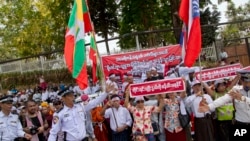Rakhine nationalists in Myanmar have rejected the news that former U.N. Secretary-General Kofi Annan will head a commission to discuss ethnic conflict and clashes in Myanmar's Rakhine state.
The creation of a commission led by foreigners with no background knowledge or capacity to understand the circumstances in Rakhine state would undermine the rights of all of Burma's ethnic groups, as well as Myanmar's sovereignty, said Arakan National Party vice chairperson Aye Nu Sein.
She said it was not necessary to form another commission, since the administration of former President Thein Sein had created a Rakhine affairs investigating commission.
"I object because this makes the issue an international affair rather than domestic,” she told VOA's Burmese service. “In fact, we've already had inquiry commissions on this domestic issue that have already produced reports. So, what we want is just to follow through on the previous reports by the inquiry commission, rather than adding foreign advisers, who actually intervene and infringe upon our citizens' rights and domestic rights. It would also infringe upon our sovereignty."
Members of the former ruling party and a splinter group from democracy leader Aung San Suu Kyi's party also released a statement rejecting the Annan commission.
Khin Maung Swe, head of the splinter party known as the National Democratic Front, told VOA it is not appropriate to let foreigners lead such a commission because the Rakhine problem is an internal affair. Prominent Muslim and Rakhine leaders from Burma should handle the matter, he said.
"I don't mind if people from Burma do go out and observe how international organizations or the United Nations handle this kind of issue [in] other places,” he said. “But in this case, when our government requests an international adviser to become involved in a domestic affair, we need to rethink whether it should happen or not."
The announcement about Annan's commission was made Wednesday by the Kofi Annan Foundation.
A statement said the commission "will initiate a dialogue with political and community leaders in Rakhine with the aim of proposing measures to improve the well-being of all the people of the state."
More than 100 people were killed in Rakhine in 2012 and 100,000 remain in camps following clashes between the Rohingya Muslim minority and the Buddhist majority.
Suu Kyi, whose party ended decades of military rule in a landslide vote earlier this year, has been widely criticized by the international community for not doing more to combat institutionalized discrimination, particularly against the Muslim minority.
The panel of nine — made up of six Myanmar citizens and three foreigners — is expected to publish a report within a year of its formation. It does not include a Muslim minority representative.
This report was produced in collaboration with VOA's Burmese service.





